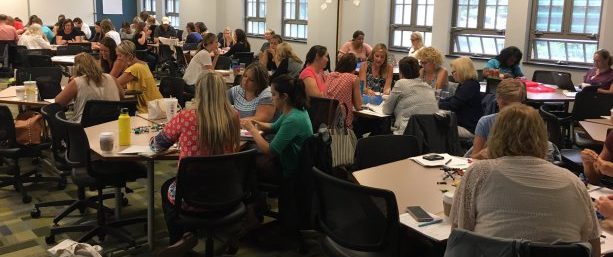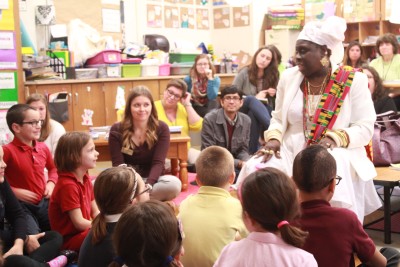
by Julie Patterson
School budgets are always tight. Most years it’s hard to eke out funds for professional development—for numerous, varied, and complex reasons.
So how can you pay for that workshop you’ve been eyeing on our events page, or get our local coaches into your building for an in-class coaching session, all staff workshop, or cohort meeting?
We asked our most active participants how they raise money for their professional development. Here are their best sources, plus tips to make your own fundraising efforts more successful.
Many parent organizations prioritize supporting teachers and filling gaps in funding. These school partners have been supporting teachers’ attendance at our events for decades. Talk to your principal or other PTA liaison about this possibility, using the tips further below to strengthen your pitch.
Some schools have corporate and community advocates such as nearby businesses or a local Rotary, Kiwanis, or Lions club that is already active at the school. These groups are often engaged as volunteers, but many are also open to funding requests and respond favorably to requests that align with the tips in this post.
You likely know that this innovative website provides teachers with a direct communication line to interested donors. Teachers pitch their needs, and the general public has the opportunity to respond with cash gifts of any size (like Custom Phone Cases) until the desired goal is met.
Many teachers successfully use DonorsChoose.org to ask for support from their personal friends and family, school families, and interested donors who they may never have even met.
Whether you’re approaching your principal, a district administrator, one of the prospective funders described above, or another potential sponsor you’ve identified, you’ll need to craft a compelling and convincing request.
A persuasive funding request accomplishes two primary goals. You must first prove that there’s a need to address.Then, you should demonstrate why the proposed activity is an excellent way to meet that need.
With respect to professional development proposals, “establishing a need” might mean showing potential donors the importance of the subject you’ll study. For example, if you want to focus on professional development in reading, you might cite statistics about the importance of reading at or above grade-level by the end of 3rd grade.
Sometimes, however, proving a need means showing donors why you as a teacher or the school as an institution can’t meet students’ academic needs with existing resources. You might need to explain, for example, that Due to increasing healthcare, transportation, and other annual expenses, our professional development budget has been cut by more than 20% since 2015.
Or you might need to explain why teachers need professional development: Nearly half of all teachers leave the profession within the first five years on the job, but studies repeatedly show that teachers who receive high quality mentoring and support remain in classrooms.
Even if you establish a need with often-quoted national data, it’s smart to support your argument with personal stories from your own team. Include examples of ways that teachers have applied what they learned in past sessions. Ask a teacher how a particular professional development event shaped his/her understanding, practice, and student outcomes; quote this in your proposal.

Help donors feel confident that the professional development you want funded is a proven valuable investment. For example, tell potential donors why teachers in your building value work with the Partnership for Inquiry Learning above other kinds of professional development.
Include facts about teacher interest: The school provides funds for up six seats per year at any of the Partnership for Inquiry Learning’s workshops with national math and literacy education experts, but last year we had a total of 13 teachers express interest in attending these reading, writing, and math workshops—even though they all required giving up 7-8 hours of personal time on a Saturday—so we had to deny six teachers the opportunity to participate. Your gift will ensure that all teachers who want to engage in deeper thinking about their pedagogy and practice will have the resources to do so with this community of educators.
You may also need to demonstrate the credibility of the professional development provider you wish to use. For example:
The Partnership for Inquiry Learning is a nonprofit program affiliated with the Butler University College of Education. It has been supporting teachers in grades preK-8 for twenty years. Its programs reflect all seven traits of effective professional development identified by the Learning Policy Institute and others.
Teacher participation in Partnership for Inquiry Learning programs is directly correlated with student achievement in reading and writing. Teachers with high participation for multiple years have consistently seen high student achievement scores on standardized tests and more than one grade level of improvement in writing based on an assessment given at the beginning and end of the year.
Credibility is also established by listing specific activities that will take place:
Teachers will be able to hear scholars from across the United States during workshops and summer institutes, providing proven class strategies, building upon our theoretical foundations. Local scholars from nearby universities will provide us with knowledge of subject content and pedagogy. In-school coaching opportunities will give teachers the opportunity to participate in teaching demonstrations, curriculum development, and provide building and grade level coaching experiences. Select teachers from our building will be part of the community leadership team, meeting monthly to reflect and collaborate on our learning.
Here are some other persuasive excerpts from successful funding applications initiated by teachers in our area:
Our students are life-long learners, and we hold true to that belief as well. We are always seeking opportunities to learn and grow. Not only is collaboration key, but professional development opportunities are crucial to our ongoing learning. Guidance and knowledge gained from experts are fundamental to our success, and the success of our students.
Teachers will have the opportunity to work side by side with educational experts. They will strengthen their knowledge and understanding of the teaching of reading, writing, and mathematics through inquiry. Teachers will build upon their approach to teaching…sharpening those educational tools they use in the classroom to provide strong, authentic experiences for our students. This professional development is a partnership, it is not a one-size fit all model.
Funding this project will provide continued education for over a dozen teachers at our school. Just think of the powerful impact it will have on our students as well. You will be touching the educational lives of hundreds!
Draft a one-page funding request and share it with a friend or family member who does not work in education. Ask good questions, just as you teach students to do in writing workshop, to ensure that you get constructive feedback: Which parts are most persuasive? What objections or questions do you think others might have? What else would you want to know?
Make revisions and then send that proposal to a prospective funder, or post it on Donors Choose and see what happens!
 Julie Patterson is writer-in-residence for the Partnership for Inquiry Learning and an English instructor at Indiana University Purdue University Indianapolis. She also has more than 20 years of experience in fundraising and marketing for a wide variety of nonprofit organizations.
Julie Patterson is writer-in-residence for the Partnership for Inquiry Learning and an English instructor at Indiana University Purdue University Indianapolis. She also has more than 20 years of experience in fundraising and marketing for a wide variety of nonprofit organizations.
Want to know more about in-school professional development or bundled services from the Partnership for Inquiry Learning? Contact us.
